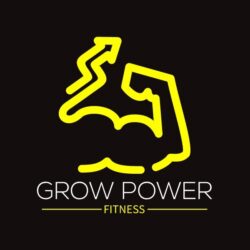In today’s health-conscious world, achieving a balanced physique with increased muscle mass and reduced body fat has become a common goal for many individuals. A well-designed meal plan can play a crucial role in supporting these objectives. This article presents a 7-day meal plan that focuses on both muscle gain and fat loss to help you attain your fitness goals effectively.
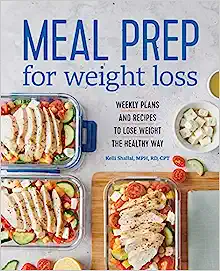
Meal Prep for Weight Loss: Weekly Plans and Recipes to Lose Weight the Healthy Way
Understanding the Importance of Diet in Muscle Gain and Fat Loss
Before delving into the meal plan, it’s essential to comprehend the significance of nutrition in achieving your desired physique. Your diet should strike a balance between macronutrients, namely proteins, carbohydrates, and fats. Additionally, understanding the concept of caloric surplus and deficit is fundamental.
Macronutrient Balance
Proteins are the building blocks of muscle, and consuming an adequate amount of protein is essential for muscle repair and growth. Carbohydrates provide energy for workouts, while healthy fats support various bodily functions, including hormone production.
Caloric Surplus and Deficit
To gain muscle, a caloric surplus is required, meaning you consume more calories than your body burns. Conversely, fat loss requires a caloric deficit, where you consume fewer calories than your body expends. Striking the right balance is crucial for a successful meal plan.
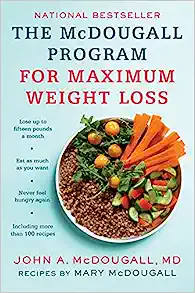
The McDougall Program for Maximum Weight Loss
Creating a 7-Day Meal Plan
Let’s dive into the 7-day meal plan, combining the right foods in a way that promotes both muscle gain and fat loss.
Day 1: High Protein Kickstart
- Breakfast: Scrambled eggs with spinach and whole-grain toast.
- Snack: Greek yogurt with berries.
- Lunch: Grilled chicken breast with quinoa and mixed vegetables.
- Snack: Almonds and an apple.
- Dinner: Baked salmon with sweet potatoes and asparagus.
Day 2: Carb Cycling for Energy
- Breakfast: Oatmeal with banana and a scoop of protein powder.
- Snack: Cottage cheese with pineapple.
- Lunch: Brown rice with lean ground turkey and broccoli.
- Snack: Carrot sticks with hummus.
- Dinner: Stir-fried tofu with bell peppers and cauliflower rice.
Day 3: Healthy Fats and Satiety
- Breakfast: Avocado toast with poached eggs.
- Snack: Mixed nuts and dried cranberries.
- Lunch: Grilled shrimp with quinoa and avocado.
- Snack: Rice cakes with almond butter.
- Dinner: Baked chicken thighs with Brussels sprouts and olive oil.
Day 4: Pre-Workout Power Foods
- Breakfast: Whole-grain pancakes with berries and Greek yogurt.
- Snack: Protein smoothie with spinach and banana.
- Lunch: Turkey and cheese roll-ups with whole-grain tortillas.
- Snack: Rice cakes with peanut butter.
- Dinner: Grilled steak with sweet potato fries and green beans.
Day 5: Post-Workout Recovery
- Breakfast: Cottage cheese with peaches and honey.
- Snack: Celery sticks with cream cheese.
- Lunch: Quinoa salad with chickpeas and cucumbers.
- Snack: Protein bar.
- Dinner: Baked cod with quinoa and steamed broccoli.
Day 6: Intermittent Fasting for Fat Loss
- Breakfast: Black coffee and water during fasting window.
- Snack: Handful of almonds.
- Lunch: Grilled chicken salad with mixed greens and vinaigrette.
- Snack: Sliced bell peppers with guacamole.
- Dinner: Baked tilapia with cauliflower rice and green beans.
Day 7: Hydration and Nutrient-Rich Foods
- Breakfast: Chia seed pudding with berries.
- Snack: Sliced cucumber with tzatziki sauce.
- Lunch: Lentil soup with a side of mixed greens.
- Snack: Rice cakes with cottage cheese.
- Dinner: Baked chicken breast with sweet potato and broccoli.
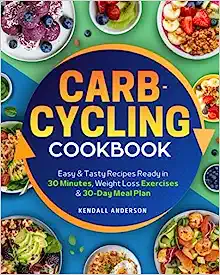
Carb-Cycling Cookbook: A Complete Guide to Reach Your Fitness Goals and Transform Your Body Without Giving Up Carbs. Easy & Tasty Recipes Ready in 30 Minutes, Weight Loss Exercises & 30-Day Meal Plan
The Role of Supplements
While a well-rounded diet forms the foundation, supplements can complement your efforts.
Protein Supplements
Protein shakes or powders can be beneficial in meeting your daily protein requirements, especially for individuals with higher protein needs.
Creatine for Muscle Gain
Creatine is a popular supplement that aids in enhancing performance during high-intensity workouts, ultimately supporting muscle gain.
Omega-3 Fatty Acids for Fat Loss
Omega-3 fatty acids promote fat loss and aid in reducing inflammation, contributing to overall health.
The Importance of Exercise
In conjunction with a nutritious meal plan, exercise plays a pivotal role in achieving your fitness goals.
Resistance Training for Muscle Gain
Engaging in strength training and lifting weights stimulates muscle growth, leading to increased muscle mass.
Cardiovascular Exercise for Fat Loss
Incorporating cardio exercises such as running, cycling, or swimming can help burn calories and facilitate fat loss.
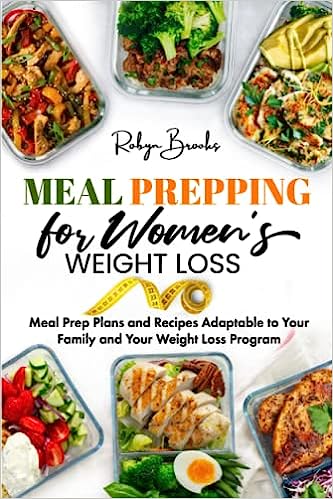
Meal Prepping for Women’s Weight Loss: MEAL-PREP PLANS AND RECIPES ADAPTABLE TO YOUR FAMILY AND YOUR WEIGHT-LOSS PROGRAM
Balancing Rest and Recovery
In the pursuit of muscle gain and fat loss, it’s vital to allocate time for rest and recovery. Muscles repair and grow during periods of rest, leading to better results.
Tracking Progress and Making Adjustments
Regularly monitor your progress and be prepared to make adjustments to your meal plan and exercise routine. What works for one person may not work for another, so it’s essential to personalize your approach.
Conclusion
Crafting a meal plan that targets both muscle gain and fat loss is an excellent step towards achieving your fitness aspirations. Remember to adhere to the right macronutrient balance, incorporate exercise, and prioritize rest. With dedication and consistency, you’ll be well on your way to a healthier and fitter you.
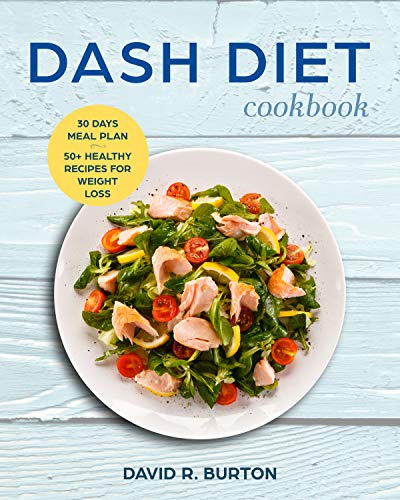
Dash Diet Cookbook: A Complete Dash Diet Program With 30 Days Meal Plan And 50+ Healthy Recipes For Weight Loss And Lowering Blood Pressure
FAQs
Is this meal plan suitable for vegetarians?
Yes, the meal plan includes vegetarian options for every day, making it suitable for vegetarians.
Can I follow this plan if I have dietary restrictions or allergies?
While the meal plan offers a variety of options, it’s essential to consult a healthcare professional if you have specific dietary restrictions or allergies.
How long should I follow this meal plan to see results?
Individual results may vary, but following the plan for at least four weeks can provide a good indication of its effectiveness.
Can I adjust the portion sizes to fit my calorie needs?
Absolutely! Adjusting portion sizes based on your caloric requirements is recommended for personalized results.
Is intermittent fasting suitable for everyone?
Intermittent fasting may not be suitable for everyone, especially those with certain medical conditions. It’s best to consult a healthcare professional before trying it.

